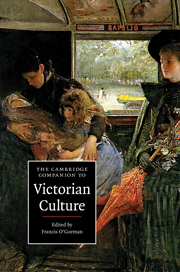8 - Popular culture
Published online by Cambridge University Press: 28 July 2010
Summary
In 1894, the publisher John Lane issued a prospectus regarding his forthcoming periodical The Yellow Book. In it, he encourages the notion that the volumes' physical surfaces and reputation will mark their owners as discriminating connoisseurs. According to the prospectus, the quarterly would 'depart as far as may be possible from the bad old traditions of periodical literature', and 'provide an Illustrated Magazine which will be as beautiful as a piece of book-making, modern and distinguished in its letter-press and its pictures'. The pages of the first volume, Lane ensures readers, are 'now being especially woven' and the book will be 'bound in limp yellow cloth'. In reality, the periodical was produced with paper that was not unique; for example, it is not rag (that is, it is not made entirely of cotton or linen) and it has no watermark or other indication of special manufacture. The image of exclusivity fabricated through the prospectus reflected neither the material resources nor the cost of production. Lane's language makes apparent not so much the preciousness of the objects as his desire for potential purchasers to expect them to be precious. The rhetoric also captures the popularization of the image of exclusivity that was a driving force behind the rise of commodity culture.
At the same time that Lane issued the prospectus, he also paid to have information about the forthcoming journal appear in other periodicals. This tactic, as Margaret Stetz and Mark Samuels Lasner point out, reflects the populist aspirations on the part of Lane who ‘took every opportunity to insist upon the significance of this venture and to instruct readers in the proper way of receiving it’. In light of Matthew Arnold’s well-known descriptions in Culture and Anarchy (1869) of upper-class refinements as exclusionary and useless, and of the ‘raw and unkindled masses of humanity’ as incompetent at discerning cultural value, Lane’s effort to fuse high-culture tastes with mass appeal can appear to be an enterprise destined to failure.
- Type
- Chapter
- Information
- The Cambridge Companion to Victorian Culture , pp. 135 - 155Publisher: Cambridge University PressPrint publication year: 2010
- 1
- Cited by



